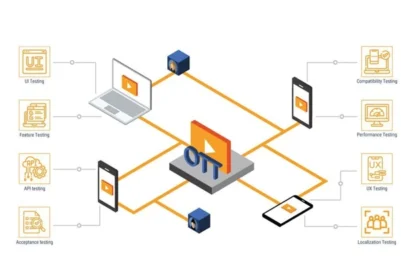Online slots are among the most popular and thrilling games in online casinos. With their engaging graphics, varied themes, and the excitement of spinning the reels, they captivate millions of players worldwide. However, behind every spin lies complex technology that ensures fairness and randomness. In this article, we’ll dive into the mechanics of how online slots generate randomness, focusing on Random Number Generators (RNGs) and how they ensure the unpredictability and integrity of each spin.
How Online Slots Work
Before understanding the randomness, it’s crucial to know how online slots function. Online slot machines are digital counterparts of traditional mechanical slots. They feature multiple reels, each with a set of symbols, and when the player presses the spin button, the reels spin to display a random combination of these symbols.
What Determines Slot Outcomes?
The outcome of each spin on a situs slot online is determined by a sophisticated algorithm known as a Random Number Generator (RNG). The RNG ensures that each spin is entirely independent of previous spins and produces a random result. This randomness is key to maintaining the integrity of the game and creating a fair experience for all players.
Random Number Generators (RNGs): The Heart of Randomness
What Is an RNG?
An RNG is a computer algorithm designed to generate sequences of numbers that lack any pattern, making them effectively random. In the context of online slots, the RNG produces random sequences that determine the positioning of the reels after each spin. This technology simulates the randomness of physical slot machines, where mechanical gears and levers dictate the outcomes.
How Does an RNG Work in Online Slots?
In online slots, the RNG continuously generates numbers even when the game is not being played. These numbers correspond to the positions of the symbols on the slot’s reels. When a player presses the spin button, the current number generated by the RNG is used to determine the outcome of that particular spin.
For example, imagine the RNG produces a number, say 1,234,567. This number is mapped to a specific combination of symbols on the slot’s reels. The moment the spin button is pressed, the RNG freezes and selects that number, ensuring that the outcome is random and cannot be predicted or influenced.
Ensuring Fairness and Randomness
To ensure fairness, online casinos use pseudo-random number generators (PRNGs), which are tested and certified by third-party agencies like eCOGRA or Gaming Laboratories International (GLI). While PRNGs use complex algorithms to simulate randomness, they do so based on an initial seed value, which ensures unpredictability. This seed value is typically generated using unpredictable factors, such as the current system time, adding another layer of security and randomness.
Can the RNG Be Manipulated?
RNGs in regulated online casinos are rigorously tested to prevent manipulation. Both the online casino operators and the game developers must adhere to strict licensing and regulatory requirements. These measures ensure that the RNG functions as intended, and players cannot manipulate or predict outcomes.
Additionally, third-party auditors regularly test the RNG to guarantee that the odds of winning remain consistent with the advertised payout percentages (Return to Player or RTP). This ensures transparency and fairness for players.
The Role of RTP and Volatility in Slot Randomness
Return to Player (RTP)
While RNGs ensure randomness, the payout structure of an online slot is determined by its Return to Player (RTP). The RTP is the percentage of all wagered money a slot is expected to pay back to players over time. For example, a slot with an RTP of 96% is designed to return 96% of the money wagered by players over a long period.
It’s essential to note that while the RTP gives an idea of the slot’s long-term payout potential, it doesn’t guarantee short-term wins or losses. Each spin remains random, and the RNG ensures that no single outcome is influenced by previous spins.
Volatility: Impacting Your Winning Experience
In addition to RTP, another important factor to consider is a slot’s volatility (or variance). Volatility refers to the risk level associated with the slot game. High volatility slots tend to pay out larger sums, but less frequently, while low volatility slots pay out smaller amounts more frequently.
RNG ensures randomness regardless of volatility, but the payout patterns dictated by volatility influence the player’s experience. High volatility slots can produce long losing streaks followed by a massive win, whereas low volatility slots offer more consistent, smaller wins.
RNGs and Bonus Features
Online slots often come with bonus features like free spins, multipliers, and special symbols like wilds and scatters. RNG technology governs the triggering of these bonus rounds as well, ensuring that they occur randomly. This unpredictability adds excitement to the game, as players never know when they might hit a bonus feature.
Myths About RNGs in Online Slots
Despite the technical reliability of RNGs, some common misconceptions persist among players:
- “Slots are due for a win after a losing streak” – Each spin is independent, and the outcome is random. A losing streak doesn’t increase the chances of a win.
- “Playing at specific times improves your odds” – RNGs operate the same way 24/7, meaning the time of day doesn’t affect your chances.
- “Higher bets increase winning chances” – While some slots may offer larger payouts for higher bets, the RNG ensures that all spins are random, regardless of the bet amount.
Conclusion
Online slots are exciting because they rely on pure randomness, thanks to sophisticated RNG technology. RNGs ensure that each spin is fair, unpredictable, and independent of previous outcomes, making every play an exhilarating experience. While other factors like RTP, volatility, and bonus features affect the overall gameplay and payout structure, randomness remains at the core of every spin. For players, this means they can enjoy the thrill of the game knowing that the outcomes are governed by certified systems that ensure fairness and integrity.










